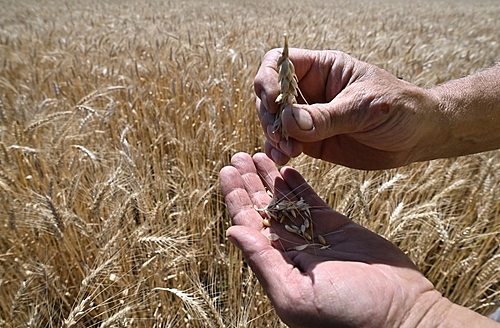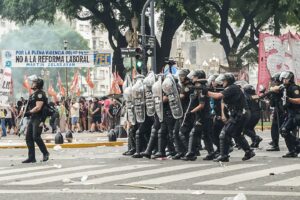
“São João, wheat on the ground” is a common saying among wheat producers in Rio Grande do Sul, says Mauricio Roman. It refers to the time of planting the seed of wheat, a winter crop. Traditionally, this is also the most favorable time for planting agrochemical-free crops, since most of the transgenic crops are summer crops, such as corn, cotton and soy. But that scenario may be about to change.
As a producer of agroecological wheat, Mauricio Roman received with surprise the news of the approval of the first transgenic wheat in the world for cultivation in Brazil. On the 2nd of March, the National Technical Commission on Biosafety (CTNBio) approved HB4 wheat from the company Bioceres, a topic that was not publicly scheduled for evaluation by the body responsible for regulating genetically modified organisms (GMOs) in the country.
The concern is valid: a non-transgenic wheat species can be pollinated by transgenic wheat, affecting and modifying its genetic composition. In addition, the already familiar concern with agrochemicals, which, through the air, affect nearby fields and, due to their toxicity, alter the cycles of the soil and the species present in it.
For this reason, like Mauricio, other producers from the Movimento dos Sem Terra (MST) in Rio Grande do Sul were alarmed by the decision. “It shocked us, because there was no debate in Brazilian society or in the producing states, which are Paraná, Rio Grande do Sul and Santa Catarina, responsible for 90% of wheat production”, comments Roman.
It is not the first silent approval by CTNBio in relation to HB4 wheat. Developed in Argentina, the biotechnology depended on the endorsement of Brazil, as it was its main buyer of wheat. In November 2021, CTNBio granted conditional approval, but only for the importation of flour. Since then, the way was opened, six other countries have already authorized HB4 wheat for import: Colombia, Australia, New Zealand, United States, Nigeria and South Africa.
However, in the case of cultivation, the risks are greater, since planting implies an intervention in the ecosystem and in other non-transgenic wheat production, whether conventional or organic. Therefore, the approval should demand a particular evaluation and approval process, different from the importation of flour.
Since 2021, the discussion on HB4 has been dampened, as highlighted by socio-environmental lawyer Naiara Bittencourt. “Precisely because CTNBio categorically stated, both in official notes and in the position itself, that approval was restricted to wheat flour [HB4] imported from Argentina”, says the lawyer for the NGO Terra de Direitos.
For this reason, he says, the approval for cultivation was unexpected. “CTNBio approved the cultivation of transgenic wheat based on the same approval process as for transgenic flour, that is, it was a decision taken at the drop of a hat.” She attributes the approval, in this case, to the fact that the composition of the technical staff is still that indicated by the Bolsonaro government. “Probably, the fear of indicating a new composition influenced the decision-making already at the beginning of 2023”, he observes.
Leonardo Melgarejo, agronomist and former representative of the Ministry of Agrarian Development at CTNBio between 2008 and 2014 points out that, by protocol, CTNBio must open public debate in the case of unprecedented GMOs in the country, in addition to promoting field impact studies.
“And this wheat is an unprecedented phenomenon, just as soy and corn were at the time”, he points out. “The CTNBio norms on environmental safety establish that the living species that reside in the spaces where the new variety will be cultivated, and that may be affected, must be evaluated. This was not done”, says Melgarejo, highlighting that it is a dribble in the biosafety law.
“In the Southern Cone, where winter is very marked, there is a kind of window closed to the use of certain pesticides during the winter, because the dominant transgenic plants – corn, soy, cotton – are summer crops, so that in winter , we have a kind of refreshment for the environment and for society because there were no cultivated transgenic plants”, he explains.
With wheat, then, this window opens, as it is a winter crop receiving agrochemicals and, therefore, with a lower possibility of recovery by the ecosystems. The agronomist emphasizes the risk: “We will then have a permanent load of poison thrown over the territory, flowing into the aquifers, which means poisoning everything.”
In addition to the composition of CTNBio’s technical staff, the support of part of the productive sector, which initially rejected the entry of transgenic wheat into the Brazilian market, may also have weighed in supporting the approval of HB4 in the country. The sector’s change of attitude came after a survey commissioned by Abimapi (Brazilian Association of Biscuits, Pasta and Industrialized Breads & Cakes) pointed out that 70% of the Brazilian population would consume transgenic wheat. Conducted by Indexsa, the survey interviewed 3,135 people in 12 capitals across the country.
ammonium glufosinate
Like any transgenic development for agriculture, the seed makes up a technological package. In the case of HB4 wheat, it is accompanied by the agrochemical glufosinate ammonium, which, according to researchers, is even more toxic than glyphosate, the latter most used in fields both in Argentina and Brazil.
For agroecological producers, the risk of this pesticide is nothing new. A few days ago, agroecological producers started a lawsuit in the Federal Court of RS precisely for the application of this herbicide. By action of the wind, the glufosinate applied in conventional rice fields can reach organic crops.
“This glufosinate dries out nearby plants,” says Roman. “This is very dangerous, because there are already studies that show that glufosinate causes cancer”, he emphasizes.
Leonardo Melgarejo points out that ammonium glufosinate is also genotoxic, a characteristic that causes deformations in the cell division process and that, therefore, can affect babies; and neurotoxic, which means that it affects the central nervous system – with the possibility of degenerative processes in adults, such as Alzheimer’s. “It is a problem from the point of view of life as a whole, in all age groups, and which will be present, for the first time in history, in a basic human diet – because the changes of this type carried out in soy or corn were intended to especially to animal feed”, he says.
During the government of Jair Bolsonaro, more than 1,500 new herbicides were released for use in Brazil. In addition to the possible impacts on the field, on the ecosystem and on health, Roman points out that this makes the work of poison-free production difficult, including its certification process.
“Only three technical laboratories are able to identify these herbicides on the plant: one in Pernambuco, one in Goiás and one in Santa Maria. These laboratories are only able to identify 40 types of poison. I can identify which product it is”, says Roman.
In addition, specialists in Argentina were already warning about the risk of mixing the grains in mills and transporting the seeds, a risk that now also includes Brazil with the cultivation of HB4 wheat.
Actions
The Public Prosecutor’s Office and the National Biosafety Council will be called upon by civil society representatives in relation to the approval of HB4 wheat for cultivation, as Naiara Bittencourt tells us. The letters will be forwarded considering the questions about the approval process by CTNBio.
In the first place, points out the socio-environmental lawyer, there was no clarity during the debate in 2021 about whether the approval was about not only consumption, but the cultivation of transgenic wheat. Secondly, the irregularities in the public hearing called in 2021, which did not have representatives of consumer rights, and the inconsistency of information provided by Bioceres – such as, for example, stating that glufosinate would not be applied because it was not even approved in Argentina, which is not confirmed. Finally, the lack of publication of studies on environmental impacts is questioned.
“There is a council of ministers made up of 11 ministers, which is the National Biosafety Council, which can reassess and make decisions in the last and final instance, any decision taken by CTNBio, also evaluating national interests, both economic and national sovereignty” , account. “We are going to file a lawsuit, pointing out all these irregularities and defects arising from the commercial authorization process for transgenic wheat.”
A new letter will also be forwarded to the Federal Public Prosecutor’s Office, understanding the need for a review of HB4 wheat, considering the impact on the environment, biodiversity and other conventional, creole or local wheat crops in Brazil.
O Brazil in fact got in touch with CTNBio and the ministries of Science and Technology and Agriculture, but did not receive answers until the publication of this article.
Editing: Thalita Pires
Source: www.brasildefato.com.br

